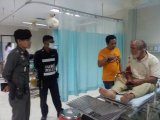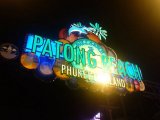An Italian tourist, lolling in an illegal beach chair, gave the katoey beach vendor a telling off as she/he urinated up against a tree. The ladyboy responded with a bitch slap or two.
And there was uproar. Other vendors rushed to the aid of the Italian, who is well-liked. Two traffic police turned up speedily. There were more angry words. We were told the offending vendor would be fined 500 baht.
We crossed the road but the metaphor lingered. Yes, we thought, the future of tourism in Patong is being urinated on from a great height. The idea that compromises can work between nature and commercialism gets up the noses of most people.
Yvonne De Haay Stekelenbrug, the highly-regarded representative for Diethelm Travel on Phuket, was more polite but just as critical of what's happening. After more than 20 years encouraging tourists to visit Patong, she can see that the task is becoming more difficult.
She hopes her bosses are able to make the point at ITB Berlin this week that Phuket's tourism future is in danger.
Dutch tourists are being treated badly by the police, she says. They can no longer bring their own beach chairs.
''Everybody is very unhappy,'' she says. ''I wonder if the governor really knows what's going on. There is still 'mafia' taking money on the beach.
''I can understand the Army doesn't want that and cleared the beaches but now slowly, slowly the 'mafia' is coming back.''
Yvonne - like Beyonce she only needs one name - has seen Patong change over 20 years. Now she doesn't like what she sees.
''You see where you can swim,'' she tells us. ''That is a small part. The rest is for the jet-skis and the parasails. They own the beach.
''And when you sit on the empty part, on their part, the parasail people come and order you away. One Australian guy who swam there, they hit him. They are very aggressive.''
Yvonne says Australians and South Africans are her main market and they don't sit on the beaches. They shop, they drink beer, they stay in resorts with pools, they go on tours.
''I know many people who come here who stay in guesthouses and who do not have access to pools,'' she says. ''The guesthouses are the ones that will suffer first because for sure, their customers will not come back next year.
''If you talk with people, you will find that they are not happy with what has happened on the beach. They came for years and years.
''The older people in particular knew the beach people, and they bought presents for the beach people. Visitors felt safe and happy with them. It's so frustrating.''
The sunbeds remain forbidden. But the mats and umbrellas have been allowed back. There is no logic to that decision.
''Now people are not allowed to bring their own beach chairs, and next year a lot will not come back.''
Cancellations are coming already: ''Heaps of cheaper hotels and guesthouses will be first to suffer.''
Germans, Norwegians and Swedes are following Dutch people in deserting Patong. The beach has, as Yvonne says, been taken over by the jet-ski and parasail operators.
''Please talk with the governor,'' is Yvonne's message to her bosses in Europe. ''Patong is now a jet-ski and parasail beach.
''Last year, the beach was full of chairs and umbrellas. They were all occupied.''
She says the one positive aspect is that the dirty water that once polluted Patong Bay has gone. The water is now great for swimming - if only people were allowed to sit on the beach and swim wherever they like.
''When I came here 22 years ago, it was so nice,'' she said. ''I don't remember jet-skis being here.
''People should be allowed to sit on their own chairs on the beach, under their own umbrellas, if they can't it's ridiculous.''



















Who owns the jet-skies, are the company accounts, names of shareholders open to for inspection?
How on earth are the parasais not a commercial business operating on public land? A glance at those 'employed' questions must be asked, are these people certified to conduct this activity? How hard can it be?
Posted by gee on March 2, 2015 11:36